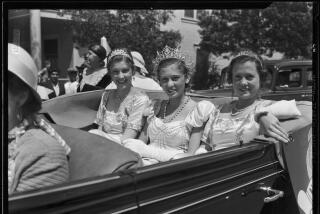It’s Survival of Cutest for Africa’s Wodabe Men
- Share via
IN GALL, Niger — Sword at his side, compact mirror at the ready, a 6-foot-tall Sahara nomad named Efad Dadi squinted with determination and girded for the ancient trial of his desert people.
Milk of a white cow for the complexion. Black kohl liner to bring out his eyes. Powdered bones of a roasted white egret to accent his lips.
“I wanted so badly to be chosen. My heart was trembling,” the 24-year-old cowherd said -- one day after giving his all in a 15-strong chorus line of smiling, swaying young men in ostrich feathers.
A world away from Miss World, in a beauty pageant that Bert Parks never could have found the words to sing about: There He Is -- Mr. Sahara. Or maybe just Mr. Oasis.
Here on the southern edge of the Sahara, it’s the young men who do the preening, singing, charming and dancing of beauty contests.
It’s women -- two or three of the comeliest of their community -- who do the judging, and the rewarding: usually, their hands in marriage to the winners.
Because among the Wodabe, a 125,000-strong tribe wandering from oasis to oasis, brawn and brains don’t matter.
Beauty is what counts -- and male beauty in particular.
The pageants are playing out under palm trees across the far reaches of the Sahara at this time of year, after rains bring respite from the year-round search for cattle fodder.
Affable and courtly, Wodabe have escaped West Africa’s bloody slave raids of centuries past and the Kalashnikov-fed mayhem of the present, thanks to their isolation and insular ways.
In a cutthroat world where men often compete for status with the power of their guns or the size of their SUVs, the peaceful Wodabe have decided that looks are all it takes.
Passing travelers over the years have reckoned the Wodabe among the happiest people on Earth.
Camel-riding cognoscenti estimate them among the most stunning: “To be ugly is to be unforgiven,” a Wodabe proverb goes.
“It is our heritage. Even our ancestors are handsome. Our women are very beautiful, and the babies they make are the most beautiful,” said Derre Chafou, a past pageant winner and son of an even more famously beautiful father.
He speaks with the confident ease of a retired champ, leaning back on cushions under a palm tree.
“If I am the man who is the prettiest, lots of women come to marry,” Chafou said. “If they are corpulent, if they aren’t beautiful, the women won’t get close.”
Trailing after longhorns all their lives, Wodabe carry with them little more than shepherd’s crooks, sleeping mats and, for the men, pocket mirrors entrusted to them soon after birth.
Women of the family coach toddling boys how to use the mirror to check for schmutz on their face, unsightly leftovers in their teeth. Starting from babyhood, mothers and sisters pull the limbs of boys to make arms and legs long and lean. They tweak the noses, trying to mold them to a point.
Beauty is so important that a homely man won’t mind his wife having a child by another man -- as long as it comes out looking good.
Wodabe allow men to have several wives.
The flip side: Wodabe women can choose two husbands.
And at the beauty pageants, it’s survival of the cutest.
“If they are fat, they don’t come to the pageant,” said Barka Gorsa, pushing 30 and still aspiring to his first pageant win and a bride. “They go and hide in the country.”
“The man with the big stomach, he can’t win the contest,” said Dadi, the cowherd.
The judges pick the top three winners with a nod or a tap on the shoulder. Losers slink off into the bush or turn to winning a bride the old-fashioned way -- with a gift of cattle.
At In Gall, a centuries-old desert crossroads town of camel skeletons and collapsed adobe huts, Gorsa and Dadi came for the most public of the annual pageants. It’s the government-sponsored event, drawing in nomads from thousands of miles across the Sahel.
When Wodabe dance, Tuareg tribesmen park their camels at the edge of crowds for a hump-high view. Niger soldiers, armed with AK-47s, hold one another’s hands as they watch.
Veiled young girls stroll under umbrellas against the North African sun, arms draped over their girlfriends’ shoulders, whispering.
Competitors’ families may spend a year on the young men’s costumes -- lading them with embroidery, dangling earrings, row after row of necklaces.
The young men sometimes travel for days to find a mountain with the right clay, the right herb, to make their red-and-yellow face paint.
But it’s magic that makes the beauty pageants as hard-fought as any in Atlantic City.
Men drape themselves with amulets and whisper charms, casting spells to catch the eye and throw off rivals’ spells.
“Men try for 10 years to get the right magic,” said Chafou, the reclining beauty. “Here, all the men are beautiful. It’s the power that makes the difference.”
At night at the pageant, Tuareg electric guitars twang across the desert. Young Wodabe men dream of pageant victory.
By day, they give their all, dancing for days -- smiling coyly, darting sideways glances to check out the response. And when they disperse into the desert, the winners -- and their panel of judges -- slip out of sight.
Dadi and Gorsa: They lost.
More to Read
Sign up for The Wild
We’ll help you find the best places to hike, bike and run, as well as the perfect silent spots for meditation and yoga.
You may occasionally receive promotional content from the Los Angeles Times.






